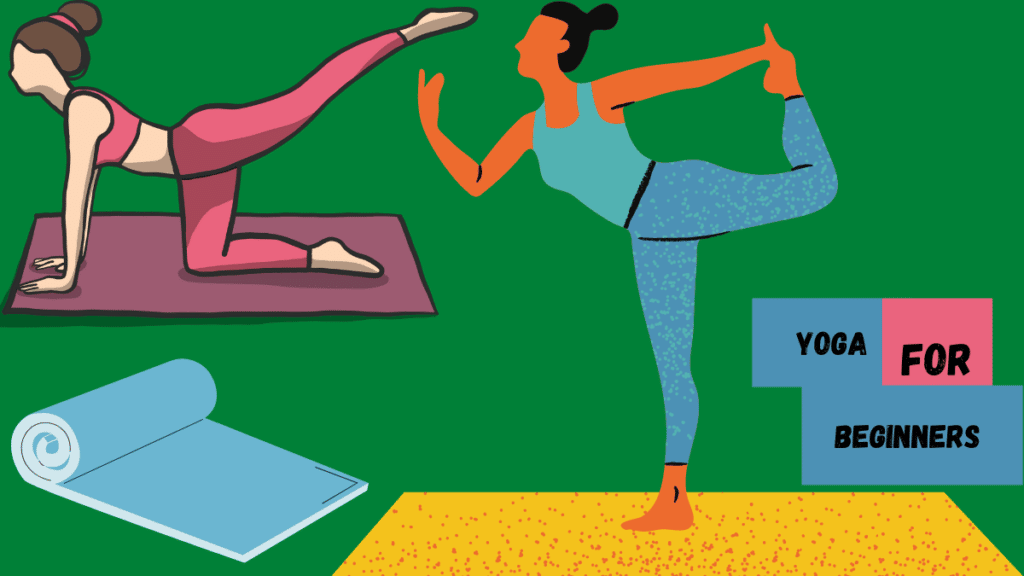Are you facing health and mental well-being issues? Yoga may be the perfect practice for you. As in our previous articles, we talk about meditation and breathing exercises. Yoga is vital because if you want to improve your focus and mental peace, you should start practising yoga. We know that it’s not easy to take time out of your busy schedule and do that much exercises and practices, but we bring an ultimate guide on yoga for beginners.

Don’t wait; just read this guide for yoga for beginners, and believe me, you will never regret it. Starting yoga will change your life, and you will see a difference between the life you are living now and the life after yoga. If we say life after yoga means healthy, calmful and energetic. Let’s start our guide of yoga for beginners. Just take a deep breath and enjoy reading because we believe it’s a life-changing guide for you.
What is Yoga?
Yoga is an ancient Indian practice that has been around for over 5,000 years. It is a combination of physical postures, breathing techniques, and meditation or relaxation techniques. The practice is designed to improve overall health and well-being, both physically and mentally.
Yoga is often associated with physical postures, or asanas, designed to improve flexibility, strength, balance and overall fitness. The postures are typically held for a while and are often done in sequence. The breath, or pranayama, is also an essential aspect of yoga, and the correct breathing technique is often emphasized during practice.
Beyond the physical practice, Yoga is often associated with a holistic and spiritual approach to living. It is believed that practising yoga can help bring balance to mind and body, leading to greater peace and well-being. The practice of yoga also includes the cultivation of mindfulness and self-awareness, which can be beneficial in reducing stress and promoting relaxation.
Benefits Of Doing Yoga
One of the main benefits of yoga for beginners is its ability to reduce stress and improve overall mental well-being. Yoga is a mindfulness practice that allows you to focus on the present moment and release negative thoughts and emotions. This can help reduce anxiety, depression, and stress and improve overall mood and well-being.
Another great benefit of yoga for beginners is its ability to improve physical flexibility and strength. Yoga poses, or asanas, are designed to stretch and strengthen the muscles and joints and can help to improve overall flexibility and range of motion. Yoga can also help to improve balance and posture, which is essential for overall health and well-being.
Types of Yoga You Can Practice
There are many different styles of yoga, and it can be difficult for beginners to know where to start. Some popular styles of yoga for beginners include Hatha yoga, which focuses on basic postures and breathing techniques, and Vinyasa yoga, a more dynamic and flowing style. It’s essential to find a style of yoga that resonates with you and your fitness level so that you can enjoy the practice and see the benefits.
To get started with yoga, it’s essential to have the right gear. A yoga mat, comfortable clothing, and a towel or blanket are all you need to get started. Learning the basics, such as proper breathing techniques, and practising regularly is also essential. Start with short sessions and gradually increase the length of your practice as you become more comfortable. Remember to listen to your body and take it easy as you start your yoga journey.
How can You incorporate Yoga into your daily life as a Beginner?
Yoga is an excellent way for beginners to improve their flexibility, strength, and overall well-being. But how often should a beginner practice yoga to see the best results?
The frequency of yoga practice will vary depending on the individual’s goals and current fitness level. However, a general recommendation for beginners is to start with 2-3 yoga sessions per week. This will give the body enough time to rest and recover between sessions while allowing consistent progress.
Starting with a beginner-friendly class, such as Hatha or Vinyasa, can also help ease the body into practice. As the body becomes more accustomed to the movements and postures, the practice frequency can increase.
It’s important to remember that yoga is not a competitive sport, and progress should be measured by how the body feels, not by how many classes are attended. If the body is feeling fatigued or sore, it’s best to take a rest day.
Wrapping Up
In summary, yoga is a holistic practice that can help beginners to improve their physical and mental well-being. It can help to reduce stress and improve flexibility, strength, balance, and posture. There are many styles of yoga to choose from, so it’s essential to find one that resonates with you. With the right mindset, gear, and regular practice, you’ll be on your way to unlocking yoga’s full potential.

